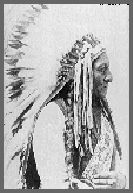


CHIEF JOSEPH
1840-1904
NEZ PERCE
Chief Joseph gave an eloquent speach to cabinet members on January 14, 1879. He asked that his people be allowed to return to their former lands. Because of this speach, his tribe was eventually allowed to return to the Northwest in 1883. However, Chief Joseph was not allowed to return. He died at the Colville Reservation at Nespelim, Washington on September 21, 1904.
"Good words do not last long, unless they amount to something. Words do not pay for my dead people. They do not pay for my country, now overrun by white men. They do not protect my father's grave. They do not pay for my horses and cattle. Good words do not give me back my children. Good words will not make good the promise of your war chief, General Miles. Good words will not get my people a home where they can live in peace and take care of themselves. I am tired of talk that comes to nothing. It makes my heart sick when I remember all the good words and all the broken promises. There has been too much talking by men who had no right to talk.....

GOYATHLAY (GERONIMO)
1825-1909
CHIRICAHUA APACHE
Everyone has heard of Geronimo. Many movies and books have been made about him. Some show the truth and some do not. He was a proud man. A man who hated being 'caged' by any restrictions. He eluded the US Army for quite some time. Finally in August of 1877, he and his small band surrendered to the Army. They were place on a reservation at Fort Sill, Oklahoma. There, he pleaded with the president to let him return to his homeland before he died.
"For twenty years we have been held prisoners of war under a treaty which was made with General Miles, on hte part of the United States Government, and myself as the representative of the Apaches. That treaty has not at all times been properly observed by the Government, although at the present time it is being more nearly rulfilled on their part than hertofore. In the treaty with General Miles we agreed to go to a place outside Arizona and learn to live as the white people do. I think that my people are now capable of living in accordance with the laws of the United states,a nd we would, of course, like to have the liberty to return to that land which is ours by divine right. We are reduced in numbers,a nd having learned how to cultivate the soil would not require so much ground as was formerly necessary. We do not ask all of hte land which the Almighty gave us in the beginning, but that we may have sufficient lands there to cultivate. What we do not need we are glad for the white man to cultivate....if I must die in bondage - I hope that the remnant of the Apache tribe may, when I am gone, be granted the one privilege which they request - to return to Arizona.

CRAZY HORSE (TASHUNKA WITKO)
1842-1877
OGLALA BRULE SIOUX
Crazy Horse was a great chief. This is a likeness of him. He did not want his photo taken. When asked for permission to do so, he replied "My friend, why would you wish to shorten my life by taking from me my shadow?" He, along with Sitting Bull, defeated Custer and his troups in 1876. The following spring he was chased by General miles to the Bighorn Mountains. He was forced to surrender and placed under arrest in September 1877. He was killed trying to escape.
"We did not ask you white men to come here. The Great Spirit gave us this country as a home. You had yours. We did not interfere with you. The Great Spirit gave us plenty of land to live on, and buffalo, deer, antelope and other game. But you have come here, you are taking my land from me, you are killing off our game, so it is hard for us to live. Now, you tell us to work for a living, but the Great Spirit did not make us to work, but to live by hunting. You white men can work if you want to. We do not interfere with you, and again you say, why do you not become civilized? We do not want your civilization! We would live as our fathers did, and their fathers before them."

SITTING BULL (TATANKA YOTANKA)
1831-1890
HUNKPAPA SIOUX
Another great one!
"What treaty that the whites have kept has the Red Man Broken? Not one. What treaty that the white man ever made with us have they kept? Not one. When I was a boy the Sioux owned the world, the sun rose and set on their land, they sent ten thousand men to battle. Where are the warriors today? Who slew them? Where are our lands? Who owns them? What white man can say I ever stole his land or a penny of his money? Yet, they say I am a thief. What white woman, however lonely, was ever captive or insulted by me? Yet they say I am a bad Indian. What white man has ever seen me drunk? Who has ever come to me hungry and unfed? Who has ever seen me beat my wives or abuse my children? What law have I broken? Is it wrong for me to love my own? Is it wicked for me because my skin is red Because I am a Sioux, because I was born where my father lived, because I would die for my people and my country?"

Backbround and buttons courtesy of
SilverHawk Creations.
Please visit his site.